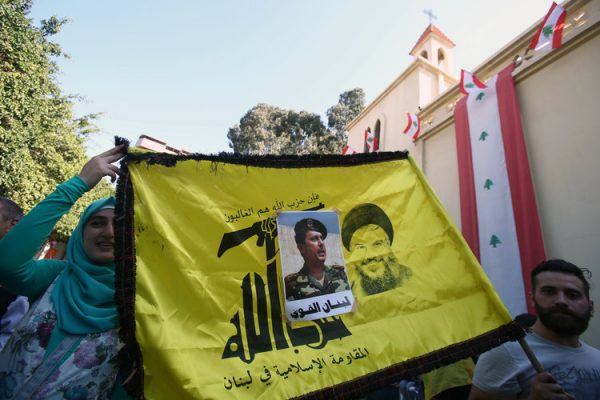
The detractors cannot believe how Aoun insists that Hezbollah was respectful of the decisions and positions made by the government.
Declarations by Lebanese President Michel Aoun to the French daily Le Figaro reaffirmed his strategic choices, which have remained static since his 2006 agreement with Hezbollah known as “the Agreement Paper.” The statements confirm accusations by Aoun’s rivals that Baabda Palace is just another facet for Hezbollah in Lebanon.
As parties close to the March 14 coalition accuse Hezbollah of dominating Lebanon, confiscating its sovereignty and independence and of monopolising war and peace decisions in Lebanon, Aoun continues to consider Hezbollah “a resistance movement defending Lebanon.”
Aoun insists on defending Hezbollah’s performance and its right to keep the weapons it owns. Above all, Aoun denies that Hezbollah has ever used the weapons inside Lebanon. Asked about Hezbollah’s right to veto all strategic decisions, Aoun told Le Figaro: “No. In Lebanon, we follow a system based on consensus, so giving one’s opinion does not mean using the right to veto.”
Asked if Lebanon was being held hostage by Hezbollah, Aoun said: “International pressure on Hezbollah is not new and it is on the rise. Some foes of the party are seeking to settle old political scores with it after they had failed to settle their military scores. Hezbollah defeated Israel in 1993, then in 1996 and especially in 2006.”
“Hezbollah’s popular base is made up of more than one-third of the Lebanese population. Unfortunately, some foreign public opinions are determined to make it their enemy,” Aoun added.
Members of the opposition in Lebanon pointed out that Aoun’s defence of Hezbollah was neither innocent nor surprising. The facts and dates given by Aoun betray that his reactions were planned, perhaps even coordinated beforehand with Hezbollah, to depict the party in a positive light in an important European newspaper.
Sources close to Prime Minister-designate Saad Hariri’s Future Movement Party pointed to the fact that the timing of Aoun’s passionate defence of Hezbollah coincided with the arguments in the Special Tribunal for Lebanon (STL), which is investigating former Lebanese Prime Minister Rafik Hariri’s assassination on February 14, 2005. STL’s public prosecutor indicted Hezbollah and the Syrian regime for having orchestrated the assassination.
Aoun has been trying to deflect accusations of Hezbollah being a terrorist organisation and present it as a normal political movement that respects the Lebanese government’s agendas and choices. His detractors say Aoun keeps overlooking the party’s decisions and behaviour, whether against Israel or during the war in Syria, which has turned out to be disastrous for Lebanon and that continues to deepen the rift the party created inside Lebanese society.
The detractors cannot believe how Aoun, who is entrusted with upholding the country’s constitution, insists that Hezbollah was respectful of the decisions and positions made by the government, especially those related to the party’s weapons, in stark contradiction to basic facts.
Aoun assured Le Figaro that Hezbollah doesn’t play any military role inside Lebanon nor is it carrying out operations on the border with Israel. For Aoun, Hezbollah’s situation “is now tied to the Middle East problem and to resolving the conflict in Syria.”
Le Figaro asked Aoun whether Hezbollah is committed to respecting international decisions taken since the 2006 war and to not attacking Israel. Aoun confirmed that Hezbollah was on the level with respect to those questions and added that “as long as Lebanon is safe from any Israeli attack, not a single bullet will be fired in its direction from the Lebanese territory but if Lebanon is attacked, it has the right to defend itself.”
Political analysts found the president’s statements worrisome. What Aoun was telling the world was that the Lebanese state has abdicated its responsibility to defend the country. The president’s statements confirmed what people inside Lebanon took for granted, that the decision is up to Hezbollah and that “it has the right to defend itself.”
Observers said they were stunned that Aoun considered integrating Hezbollah fighters in the Lebanese Army and that he left it to Hezbollah to decide on the timing of that operation. They pointed out that Aoun had promised to initiate a national dialogue to agree on a defence strategy after the general elections in May. He has done nothing of the sort and the time suggested for that dialogue does not sit well with Hezbollah’s agenda for Lebanon and the region.
Large parts of the Lebanese society have criticised Hezbollah’s participation in the war in Syria on the side of the Syrian regime. Aoun sees it differently and has praised Hezbollah for interfering in Syria “against Daesh (the Islamic State) and an-Nusra forces in Syria” and related a different version of the events. Aoun said: “The terrorists were attacking our territory and Hezbollah was defending it.”
Lebanese sources said Aoun’s statements came a few days after an official visit to Beirut of a US delegation led by FBI Director Christopher Wray. The US delegation reportedly did not explicitly bring up the subject of Hezbollah while in Lebanon. Leaked information, however, raised the likelihood of US sanctions against Lebanon and its institutions if some of these institutions continue to side with Hezbollah’s that are classified as terrorist.
Political observers in Lebanon said they were stunned that no official voice in the government dared criticise Aoun’s pro-Hezbollah stance. They said the views coming from the president regarding Hezbollah do not represent the positions of most Lebanese. That consideration is the reason why there is great wariness in Beirut over the domestic and international ripple effects that could ensue.
AW

Leave a Reply
You must be logged in to post a comment.